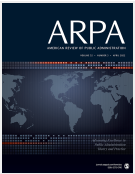Connecting Theory with Practice: The Institutional Evolvement of U.S. Counties Functioning as Regional Service Providers
Author
Jayce L. Farmer
The American Review of Public Administration (2018), Volume 48, Issue 8
Jayce L. Farmer
The American Review of Public Administration (2018), Volume 48, Issue 8

Abstract
This study extends the literature on county government structure by examining the three basic forms of county governments and their long-term effects on regional service spending. An examination of 1,532 U.S. counties between 1977 and 2012 reveals that those with the commission government form produce on average less regional service spending than those with reformed government structures. Examining the two major distinctions in reformed government types reveals that elected executive governments spend on average more than those with the commission-administrator form. However, the amount of increase for elected executive spending was very minor. The findings also reveal that the ability to establish home rule charters alters the effects of government structure for commission and commission-administrator counties. Meanwhile, charter-enabling laws matter little regarding the effects for elected executive counties. The analytical results lead to four major points for consideration regarding the link between county service provision and county institutional arrangements.
This study extends the literature on county government structure by examining the three basic forms of county governments and their long-term effects on regional service spending. An examination of 1,532 U.S. counties between 1977 and 2012 reveals that those with the commission government form produce on average less regional service spending than those with reformed government structures. Examining the two major distinctions in reformed government types reveals that elected executive governments spend on average more than those with the commission-administrator form. However, the amount of increase for elected executive spending was very minor. The findings also reveal that the ability to establish home rule charters alters the effects of government structure for commission and commission-administrator counties. Meanwhile, charter-enabling laws matter little regarding the effects for elected executive counties. The analytical results lead to four major points for consideration regarding the link between county service provision and county institutional arrangements.